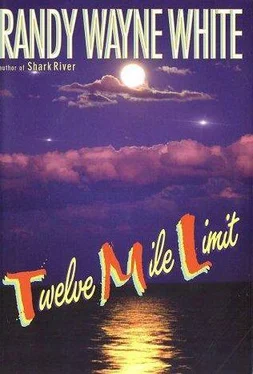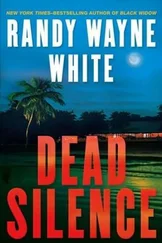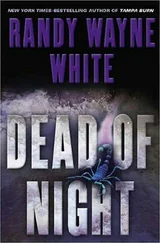Randy White - Twelve Mile Limit
Здесь есть возможность читать онлайн «Randy White - Twelve Mile Limit» весь текст электронной книги совершенно бесплатно (целиком полную версию без сокращений). В некоторых случаях можно слушать аудио, скачать через торрент в формате fb2 и присутствует краткое содержание. Жанр: Триллер, на английском языке. Описание произведения, (предисловие) а так же отзывы посетителей доступны на портале библиотеки ЛибКат.
- Название:Twelve Mile Limit
- Автор:
- Жанр:
- Год:неизвестен
- ISBN:нет данных
- Рейтинг книги:4 / 5. Голосов: 1
-
Избранное:Добавить в избранное
- Отзывы:
-
Ваша оценка:
- 80
- 1
- 2
- 3
- 4
- 5
Twelve Mile Limit: краткое содержание, описание и аннотация
Предлагаем к чтению аннотацию, описание, краткое содержание или предисловие (зависит от того, что написал сам автор книги «Twelve Mile Limit»). Если вы не нашли необходимую информацию о книге — напишите в комментариях, мы постараемся отыскать её.
Twelve Mile Limit — читать онлайн бесплатно полную книгу (весь текст) целиком
Ниже представлен текст книги, разбитый по страницам. Система сохранения места последней прочитанной страницы, позволяет с удобством читать онлайн бесплатно книгу «Twelve Mile Limit», без необходимости каждый раз заново искать на чём Вы остановились. Поставьте закладку, и сможете в любой момент перейти на страницу, на которой закончили чтение.
Интервал:
Закладка:
Conclusion: Janet, Grace, and Michael had either been killed, or they were being held prisoner, or they’d been abandoned on some remote island where they could not make contact with friends and family.
The indirect linkage came into my mind again, and the word sucked some of the light out of the room: Colombia.
The fourth and final frame gave no clue: water and just the stern quarter of the shrimp boat, with the name in white- Nan-Shan, Port of Cortez. No people. No faces.
I was still studying the third frame twenty minutes later when the images suddenly darkened, faded, then disappeared as the strip of paper turned black.
Speaking on his cell phone, Cmdr. Dalton Dorsey said, “What I don’t understand is, why this sudden interest in a shrimp boat named the Nan-Shan? I’ll help you any way I can, Doc, but you need to be upfront with me.”
An unavoidable consequence of involvement with the intelligence agencies is the obligation not only to lie, but to lie convincingly and plausibly.
I was never good at it, not even when I was duty-bound to lie. I’m still not good at it, so I loathe any social or professional situation that requires it. However, back in the days when lying was a necessary part of my day-to-day life, I came up with a technique that, at least, made duplicity manageable. The method is simple: Speak factually, but omit the larger truth.
It had taken me nearly an hour to reach Dorsey. Now I was outside by the big fish tank on the lower deck of my stilt house, pacing nervously. I said to him, “The reason I’m interested in that particular boat has to do with a newspaper story I read a few weeks back. I don’t know why it took me so long to make the connection. Do you remember reading about those illegal aliens the immigration people found down in the’Glades?”
“Sure, our people worked the cleanup search. There were forty-seven out there lost, mucking around in the sawgrass. Three ended up corpses, and the vultures didn’t leave much. One of them was a child, only three or four years old. Two more adults died later. So what’s the connection?”
“The time window. I’m not certain of the exact date, but the feds-maybe your people-found the refugees a week or so after the Seminole Wind sank.”
“A private plane spotted them, and Naples air traffic control forwarded the information to Immigration. Yeah. Okay, I see where you’re headed with this. The coyote boat that dumped them in the Ten Thousand Islands was in the area at the same time the three victims were adrift.”
I said, “Coyote boat?”
“The boat that brought the illegals. The question is,” he said, “what gives you the idea the coyote boat was a shrimper named the Nan-Shan?”
A perceptive man, my Coastie friend.
“I can’t tell you, Dalt. I would if I could. But it’s good information. You’ve got to trust me on this one.”
A familiar professional restraint had crept into his voice. In the uniformed services, duty always comes before friendship. “I trust you or we wouldn’t be talking. So what are you asking me to do?”
“I’d like to get some information about the boat. A boat that size, it’s a registered vessel. Who owns her, who runs her? And those refugees-where are they? What do I have to do to interview them?”
Dorsey seemed to relax a little-that’s all I was asking? “As far as the boat goes, you could call the federal documentation office in Miami, but I don’t think they’d help you much. Or I can run what we call an EPIC search. That stands for El Paso Intelligence Center-which I suspect you already knew.”
I did, but said nothing. In fact, I’d once had reason to visit that high-security facility out in the New Mexican desert. I remembered soundproof rooms and a forest of satellite antennas.
“The EPIC maintains a database system,” Dorsey said, “that all the federal agencies use. Particularly the agencies that deal with drugs, refugees, that sort of thing.
“Let’s say the shrimp boat you’re interested in was stopped and searched for drugs, five or ten years back. All the information goes into the EPIC database, whether drugs were found or not. Vessels that we know the bad guys own, or vessels we suspect are dirty, all go into the computer, too. Nothing has to be proven. There’s a lot of interesting reading in that file. Can you confirm the spelling of the vessel’s name?”
I did, then added, “And what about talking to some of those refugees? If they saw three people adrift, they have no reason not to tell me about it.”
“You’re out of luck, there. I happen to know the whole group was transported to the Immigration and Naturalization Service facility in Miami. The State Department has the process so streamlined that it takes less than a couple of weeks-unless the refugees happen to be Cuban, and there’s a question of political asylum. They get fingerprinted, photographed, then a quick physical. Couple days later, once the State Department has gotten the okay from the home country, they’re herded onto a military transport and shipped back to where they came from. In this case, it was Colombia. Probably flew them into Bogota.”
“That’s what I was afraid of.”
Dorsey told me he’d check the computers and give me a call in an hour or two.
I stayed busy in my lab assembling the digitized video camera system. My old stilt house is constructed of heart pine, solid as a small ship, built by the long-defunct Punta Gorda Fish Company back around 1920-many hurricanes ago. I used a rechargeable drill to fix the bracket to a wooden beam in the corner of the room. As the screws burrowed into the beam, they augured yellow wood to the surface, releasing pine resin nearly a century old. That pleasant pine smell mixed with the ozone odor of the lab.
When the bracket was solid, I threaded the camera onto the male base, then toyed with it until the view through the lens, at its widest angle, included the crab tanks, the door to the lab, and some of the aquaria along the eastern wall.
I had to use an extension cord to plug in the 12-volt converter. Finally, I touched the camera’s on switch, allowing the computerized timer mode to take control.
Nothing or no one could come through the door, approach the crab tanks, and avoid the lens of that camera.
I was standing there, admiring my handiwork when the telephone rang. Commander Dorsey had some interesting-and troubling-information.
“Turns out your intel about the Nan-Shan may be right,” he began, then laughed. “So why am I not surprised?”
He went on to tell me that the vessel had been searched by the Coast Guard twice in the last six years, suspected of carrying drugs, and once by agents from the INS because the owner was suspected of being involved in the people-smuggling trade. No arrests were made.
“Internationally, people smuggling gets bigger and bigger every year. Big financial return with a minimum of risk. That’s not my area of expertise, but I’ve got a State Department briefing paper on it. I can send you a copy if you want.”
I told Dorsey I would be very interested in reading the report, then made notes as he told me that the owner of the Nan-Shan was a man named Dexter Ray Money of Sarasota County. The EPIC had him flagged as a career criminal who’d been arrested and charged with crimes that, over a span of two decades, included grand theft, drug trafficking, extortion, assault and battery, and manslaughter.
“Money got off on everything but the drug-trafficking charge. He spent seven years in Raiford for that, but he’s been out for more than ten years. He’s a suspect in three murders, including the manslaughter charge, so I don’t think running illegals would bother him much at all. He owns three trawler boats, all out of Cortez. The Nellie, the Rebel Witch, and the Nan-Shan. A very bad man.”
Читать дальшеИнтервал:
Закладка:
Похожие книги на «Twelve Mile Limit»
Представляем Вашему вниманию похожие книги на «Twelve Mile Limit» списком для выбора. Мы отобрали схожую по названию и смыслу литературу в надежде предоставить читателям больше вариантов отыскать новые, интересные, ещё непрочитанные произведения.
Обсуждение, отзывы о книге «Twelve Mile Limit» и просто собственные мнения читателей. Оставьте ваши комментарии, напишите, что Вы думаете о произведении, его смысле или главных героях. Укажите что конкретно понравилось, а что нет, и почему Вы так считаете.












